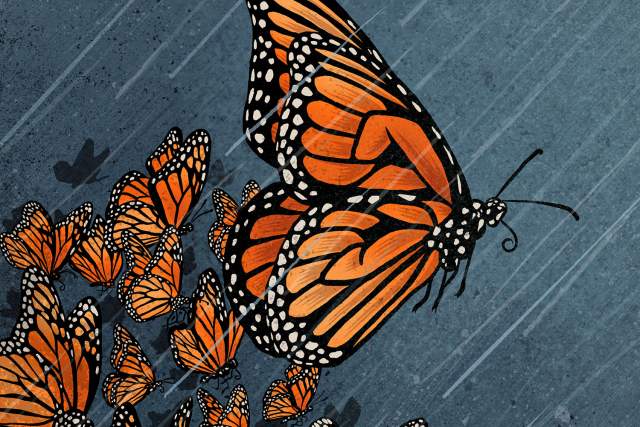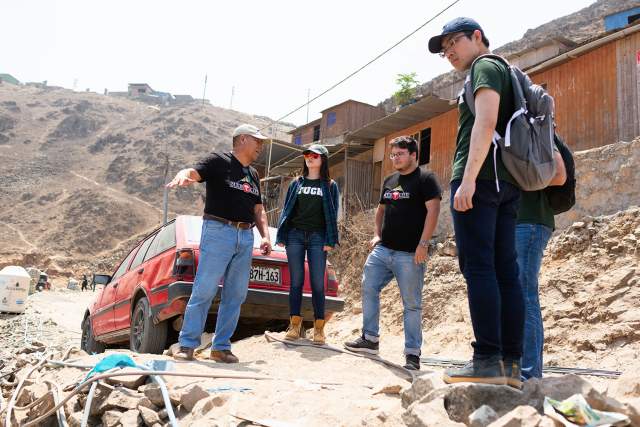Bracing for Brexit
A GIX to Ireland and the UK highlights the costs of political uncertainty.
by Kirk Kardashian
Apr 11, 2019
In the days leading up to the 2016 referendum on Brexit, very few political observers or business leaders predicted that a majority of voters in the United Kingdom would vote for the UK to leave the European Union.
As we now know, they were wrong. That surprising outcome set in motion a process that was supposed to conclude on March 29, 2019 with the UK officially severing ties with the EU. That looming deadline was just a week after the end of Tuck’s March break, so the timing was perfect for a Global Insight Expedition (GIX) to that region, where students could learn about the myriad ways political uncertainty can impact businesses, countries, and individual people.
Lisa Miller, the director of the Global Insight Expedition course, knew of two perfect people to lead the trip. One is Thomas Lawton, a visiting professor of business administration at Tuck. Lawton studies the intersection of geopolitics and business strategy and is based at Cork University Business School, University College Cork, in Ireland. The other is John McKinley, the executive director of the Center for Business, Government and Society, who spent two years at BlackRock’s London office, where he was a founding member of its sustainable investment team. “I had moved to London just a month after the historic Brexit vote in 2016,” McKinley says. “This was an exciting opportunity to return and experience the continued uncertainties through the eyes of Tuck students. The GIX offered students a front row seat to history.”
John McKinley, executive director of the CBGS and former BlackRock executive, co-led the Tuck course.
The group began its expedition in Cork, where students visited the Irish headquarters of Johnson Controls, a company that designs and produces building control systems. They met with a vice president of the company and got a tour of the building, which is a showcase for the firm’s technology and considered the “smartest building in Ireland.” “Beyond their technology solutions, we discussed how Johnson Controls is managing the potential demand shocks associated with Brexit,” explains trip member Arch Vamanrao T’20.
The group also visited Jameson’s largest whiskey distillery and learned how Brexit might impact its operations. Jameson exports its whiskey all over the world, but it sources its bottles, labels, and even bottlecaps from the UK, so Brexit could create a supply chain disruption for the company. Similarly, the agriculture industry is vulnerable to Brexit, since Ireland exports 40 percent of its production to the UK. “We were realizing that most sectors in Ireland will potentially be badly hit by a hard Brexit,” Lawton says, referring to a Brexit scenario without carefully crafted customs and trade provisions.
But there’s more at stake in Ireland than just business interruptions from Brexit. Since the Good Friday Agreement of 1998, which ostensibly ended the sectarian conflict in Northern Ireland, the border between Northern Ireland (legally part of the UK) and the Republic of Ireland has been open, like borders between other EU members. After Brexit, the border, and relations between north and south on the island of Ireland, could get a lot more complicated. To gain perspective on this, the group spent some time touring Belfast, Northern Ireland’s capital city, which still has 18-foot-high walls separating Catholic and Protestant communities. It was an eye-opening experience for Kate Hartford T’20. “I hadn’t realized that Belfast, while it’s come a long way, is still a deeply divided city,” she says. Brexit may compound that division and reignite old enmities.
The number one takeaway for me is the cost of political uncertainty. If I’m ever faced with a situation of political uncertainty, I’ll be able to think about deploying capital to manage it.
In the second half of the trip, the group visited financial and consulting firms in London, including BlackRock, Eurasia Group, Control Risks, and Daiwa Capital Markets. These companies are spending considerable human and financial resources on ensuring they can still do business in the EU after Brexit. The students learned that Daiwa Capital, for example, opened a new office in Germany so it would be able to operate in both the EU and the UK.
“The number one takeaway for me is the cost of political uncertainty,” says Hartford, who is returning to McKinsey & Company after Tuck. “I think there are really good lessons in there for business leaders such as myself. If I’m ever faced with a situation of political uncertainty, I’ll be able to think about deploying capital to manage it. And it’s great that I’ve now had exposure to that.”

